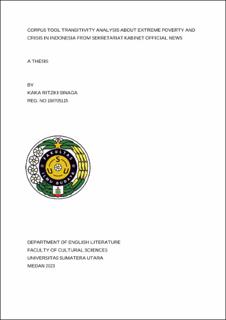Corpus Tool Transitivity Analysis About Extreme Poverty and Crisis in Indonesia from Sekretariat Kabinet Official News

Date
2023Author
Sinaga, Kaka Ritzki
Advisor(s)
Sinar, T Silvana
Zein, T Thyrhaya
Metadata
Show full item recordAbstract
This thesis aims to describe and analyze the news with Transitivity. This study uses a Sytemic Functional Lingusistic by Halliday (1981). This study used a qualitative method by Creswell (2014) to analyze the transitivity. Based on the analysis that has been done, it is found that users of the application are advised to rely on the entirety of its results. It is recommended to exercise discernment and consider the potential for variability or limitations in the application’s outputs. There are two kinds of processes in relation with the goal: (1) creative processes, and (2) dispositive processes. In the creative process, the actor is making the goal through the process (the verb), such as: create, make, build, develop, etc. While in the dispositive process, the actor is affecting the goal through the process (the verb), such as: send, throw, pour, dissolve, etc. These processes are usually done through transitive verb forms. On the other hand, in the happening processes there are no goals involved in the process. Happening processes occur by chance, or, without being planned. The processes are usually done through intransitive verb forms, such as: rise, fall, come, go, melt, soften, move, harden, etc. Based on the result of the research of how material process gives more meaning to the context of extreme poverty and crisis in Indonesia, the researcher found out of the 22 data in total material process of doing come with 54,5% and material process of happening with 45,5%.
Collections
- Undergraduate Theses [873]
